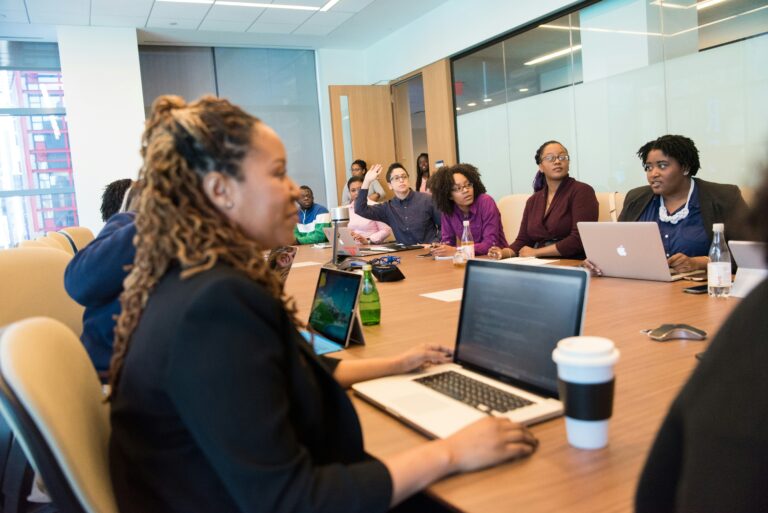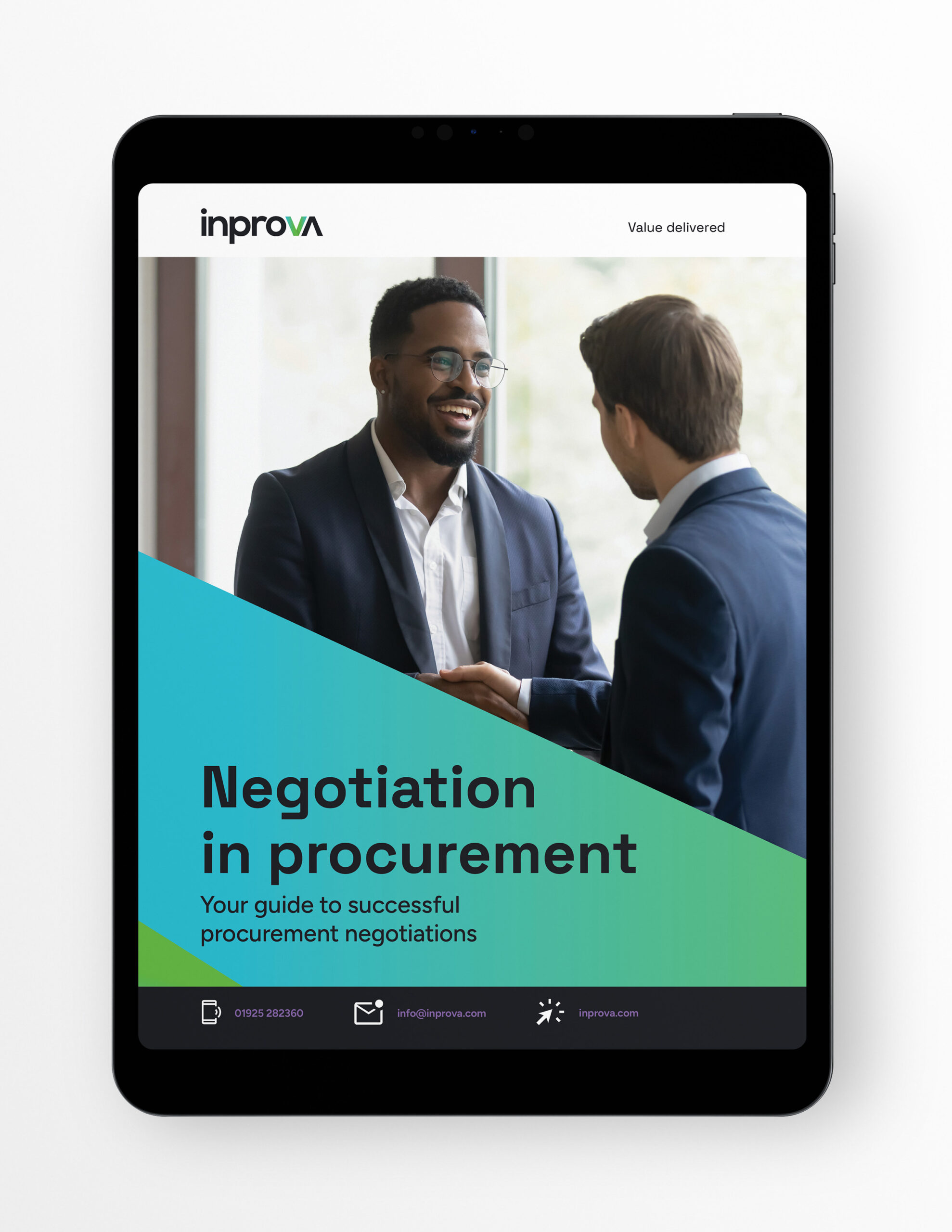- ConsultancyProcurement TransformationSourcing and Managed ServicesCost OptimisationSupply Chain ManagementSustainable Procurement
- Frameworks & DPS
- Commercial Procurement
- Technology
- Resources
- Why Inprova
- Contact Us
Inprova
Free download: strategies, tips and tools to negotiate better supplier agreements
Download your guide!
Procurement negotiation is one of the most valuable and misunderstood skills in procurement.
Done well, it helps you secure better value, protect relationships, and reduce risk. However, done badly, it leads to delays, supplier friction, and costly compromises.
This free procurement negotiation guide gives you a practical framework to negotiate with confidence, prepare thoroughly, and get the outcomes your organisation needs.
What’s inside the guide?
Whether you’re new to supplier negotiations or want to sharpen your approach, this guide includes:
A step-by-step procurement negotiation strategy you can apply to any situation
The 6 key stages of negotiation and how to handle each one with clarity
How to use BATNA to protect your position and avoid one-sided deals
Proven negotiation tips for procurement professionals under pressure
A ready-to-use supplier negotiation checklist to guide your prep every time
You’ll walk away with a practical toolkit, not just theory, that helps you lead stronger, more effective procurement negotiations.

Why is negotiation important in procurement?
Negotiation in procurement isn’t just about pricing.
It affects everything from delivery timelines and service quality to compliance and supplier relationships.
By following a clear negotiation strategy, procurement professionals can:
Make better decisions under pressure
Avoid rushed or reactive deals
Strengthen supplier collaboration
Ensure contracts deliver on long-term goals
That’s exactly what this guide is built to help you do.
Who is this for?
This guide is designed for:
Procurement professionals and category managers
Commercial leads and contract managers
Anyone responsible for negotiating with suppliers
Whether you’re leading high-value tenders or managing day-to-day supplier performance, this guide helps you stay prepared, structured and in control.


Written by procurement experts
This guide was created by the team at Inprova, we are specialists in public sector procurement.
We work with procurement teams across the UK to support strategic sourcing, supplier management and contract negotiation. Everything in this guide comes from our experience and expertise.
Procurement negotiation is the structured process of reaching mutually beneficial agreements with suppliers for goods, services, or works. It’s a critical skill that helps ensure public funds are used effectively, delivering maximum value. Effective negotiation influences delivery schedules, service quality, regulatory compliance, and the strength of your long-term supplier relationships. By mastering this, you can achieve optimal value, mitigate risks, and foster more robust collaborations that ultimately benefit the communities we serve.
We’ve designed this guide for a broad range of professionals engaged in supplier interactions. This includes procurement professionals, category managers, commercial leads, and contract managers. Essentially, anyone responsible for negotiating with suppliers, whether managing high-value tenders or overseeing day-to-day supplier performance will find this guide an invaluable resource for ensuring compliant and effective procurement.
The guide provides a comprehensive toolkit for effective negotiation. It outlines a clear, step-by-step procurement negotiation strategy, details the six key stages of negotiation and how to navigate each with confidence, explains how to utilise BATNA (Best Alternative to a Negotiated Agreement) to strengthen your position, offers proven negotiation tips for procurement professionals, and includes a practical supplier negotiation checklist to ensure thorough preparation.
Our negotiation guide offers practical insights taken from our team and actionable strategies to complement your existing expertise. By exploring its structured framework, you can enhance your ability to make more informed decisions under pressure, secure robust agreements, strengthen supplier collaboration, and ensure contracts genuinely support your organisation’s long-term objectives and the efficient use of public funds. It equips you with a practical toolkit for leading more successful and impactful negotiations.
Absolutely. This guide has been developed at Inprova by specialists with extensive experience in public sector procurement. The strategies and advice provided are directly applicable and highly beneficial for procurement teams operating within the public sector, helping you address unique challenges, ensure compliant purchasing, and achieve optimal outcomes for your organisation and the communities it serves.
Yes, we encourage you to share this guide with your team and colleagues. It is designed to help individuals and entire teams enhance their negotiation capabilities, fostering a more consistent and effective approach to supplier negotiations across your organisation, ultimately contributing to better value for the public purse.
BATNA stands for Best Alternative to a Negotiated Agreement. It refers to the most advantageous course of action a party can take if a negotiation does not result in an agreement. In procurement, understanding your BATNA (and ideally, your supplier’s BATNA) is crucial as it provides leverage, defines your minimum acceptable terms, and helps you avoid accepting unfavourable deals. The guide explains how to effectively use your BATNA to strengthen your negotiating position and ensure the best possible use of public resources.
Effective procurement negotiation significantly reduces risk by clearly defining terms and conditions, ensuring compliance with relevant regulations, establishing robust service level agreements, and building transparent, trusting supplier relationships. This proactive approach enables the early identification and mitigation of potential issues such as supply chain disruptions, quality control concerns, and contractual disputes. By securing reliable and compliant agreements, you ensure continuity of essential services and goods, directly benefiting the communities you serve and safeguarding public funds.
Common pitfalls include insufficient preparation, an exclusive focus on initial price rather than overall value, failing to understand the supplier’s perspective, neglecting long-term relationship building, making assumptions, and not having a clear BATNA. The guide provides valuable insights and strategies to help procurement professionals avoid these common mistakes and achieve more successful negotiation outcomes that deliver better value for money.
The frequency of negotiation varies depending on factors such as contract duration, market conditions, supplier performance, and the strategic importance of the goods or services. While formal negotiations occur during contract initiation or renewal, ongoing communication and relationship management are continuous processes. The guide advocates for a strategic approach to negotiation, rather than merely reactive responses, to ensure continuous value, strong supplier relationships, and the best use of public funds.